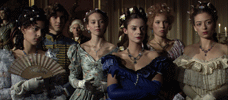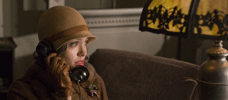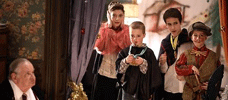Reviews
A Corte do Norte
João Botelho
Portugal, 2008
Credits
Review by Jenny Jediny
Posted on 29 September 2008
Source Animatógrafo II HD
Categories The 46th New York Film Festival
A mist-covered mountainous landscape, rustling hoopskirts, and familial secrets cluster together in João Botelho’s at best perplexing, but mainly lackluster film The Northern Land, the director’s interpretation of Portuguese writer Agustina Bessa-Luís’s novel. (Bessa-Luís is co-credited for the film’s screenplay.) Drawing from a sensuously emphasized account of personal histories and ghosts of forgotten ancestors, The Northern Land aims to unravel the seemingly intricate mystery within a family tree, and also engage its audience in its labyrinthine method of storytelling. Unfortunately, the film falls far short in both of these ambitions.
Memory and the concept of identity (both personal and cultural) are at the root of Botelho’s film, but the theoretical overwhelms any possibility of involvement. Perhaps this is Botelho’s goal—both the visual look of The Northern Land and its performances are highly artificial. Certainly not a costume drama, the film looks very much like one concocted within the framework of a film such as Inland Empire. Shot in HD, the costumes and décor (think overstuffed drawing rooms, with enough knickknacks to convince not so much of a rich family history but rather an overambitious set decorator) trick the senses, promising a sumptuous quality that never materializes. The result is a dull, matte surface that reflects the stiff, overly theatrical performances. It’s an interesting contradiction, questioning expectations—are the stilted performances in Lynch’s film acceptable in part due to the correspondingly ugly landscape, while The Northern Land’s opposing elements eliminate the same kind of acceptance?
Casting a single actress, Ana Moreira, in several roles that run the timeline of past to present, poses a similar conundrum. I’ll fully admit to having difficulty keeping her various roles - as an aunt, a great-grandmother, and others linked to their lives - straight, but by the conclusion of the film it seemed to matter little exactly who she was portraying—no one is developed enough to the point of individuality, instead becoming chainlinks to the past. The connection between these women is their streak of independence and rebel status within different periods of history, but it’s all very monotonous—there’s a sense that the film expects us to accept their notoriety without ever convincing us of it or explaining why their present day relatives would even care so very much about it (particularly to the point of one family member committing suicide over the mystery, a note that rings more falsely than anything else in the film).
The experimentation here is at times intriguing, mainly due to the choice of shooting format, but overall the distance felt in The Northern Land, not only within the family, but between us and the screen, detracts from any genuine effect. While the young daughter eventually solves her puzzle, with much relief (and almost natural joy), we’re left with rather heavy heads, wondering what the questions were in the first place.
More The 46th New York Film Festival
-

Wendy and Lucy
2008 -

The Northern Land
2008 -

The Last Command
1928 -

Hunger
2008 -

Lola Montès
1955 -

Summer Hours
2008 -

Gomorrah
2008 -

Changeling
2008 -

Che
2008 -

I’m Gonna Explode
2008 -

Waltz with Bashir
2008 -

Happy-Go-Lucky
2008 -

The Windmill Movie
2008 -

Tulpan
2008 -

Afterschool
2008 -

A Christmas Tale
2008 -

The Headless Woman
2008 -

Bullet in the Head
2008 -

Four Nights with Anna
2008 -

Night and Day
2008 -

The Class
2008
We don’t do comments anymore, but you may contact us here or find us on Twitter or Facebook.



